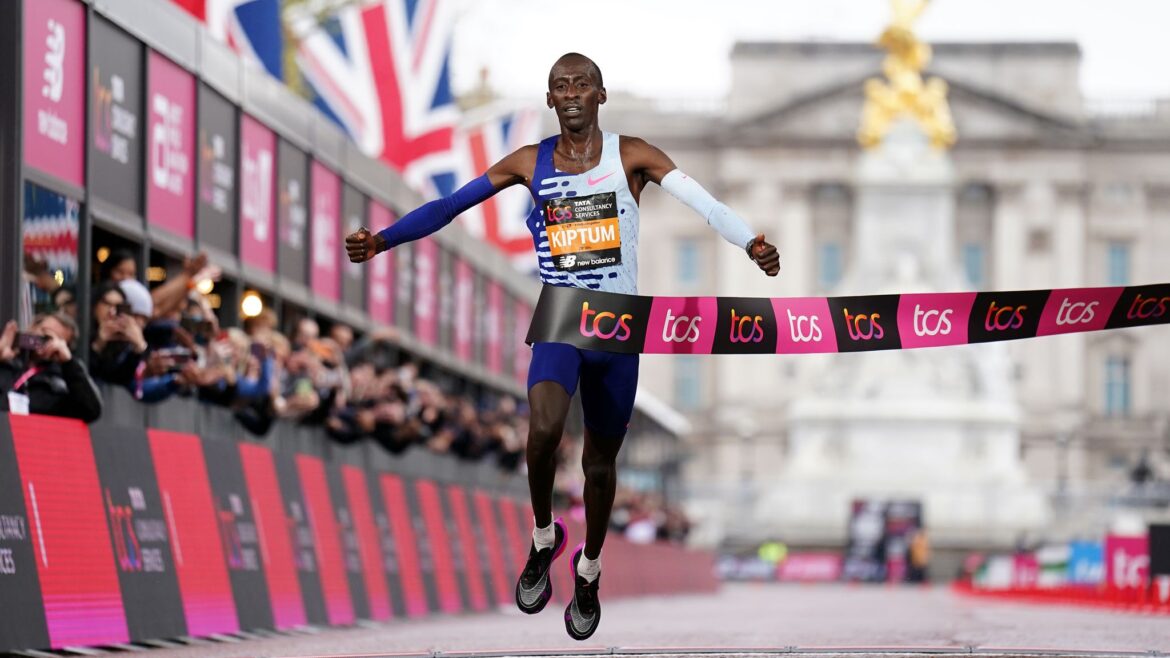Kelvin Kiptum from Kenya, on April 23, 2023, electrified the running world by winning the London Marathon in a course-record 2:01:25. The 23-year-old’s fearless performance left seasoned athletes trailing, as he sliced over a minute off the previous best. Spectators roared as Kiptum surged ahead in the final miles, his fluid stride masking the brutal pace.
Months later, Kiptum delivered another masterclass. At the October 2023 Chicago Marathon, he crossed the line in 2:00:35 – obliterating Eliud Kipchoge’s world record by 34 seconds. Unlike Kipchoge’s staged sub-2-hour run in 2019, with rotating pacemakers and controlled conditions, Kiptum’s Chicago triumph came in a standard race. He ran the second half faster than the first, a near-impossible feat in elite marathoning. Fans and rivals alike marvelled at his audacity. “He’s rewriting the rules,” said former champion Paula Radcliffe.
Kelvin Kiptum’s rise was meteoric. His 2022 Valencia Marathon debut of 2:01:53 remains the fastest first marathon ever. By 2023, he’d won all three marathons he entered, each faster than the last. Coaches analysed his low arm carriage and rapid cadence, while physiologists studied his ability to sustain 4:36-per-mile speeds. Kiptum, a father of two from Kenya’s Rift Valley, shrugged off the hype. “I just run,” he told reporters.
The athletics world buzzed with anticipation for April 2024. Kelvin Kiptum planned to attack the two-hour barrier at Rotterdam, a flat course ideal for speed. Training logs revealed he’d clocked 40-kilometre practice runs at world-record pace. “Sub-2 is possible,” he insisted.
Meanwhile, tragedy struck on February 11, 2024. Kelvin Kiptum and coach Gervais Hakizimana died when their car veered off a road in Kaptagat, Kenya. The crash left the sports community reeling. Tributes poured in from Kipchoge, World Athletics, and Kenya’s president. Kiptum’s widow, Asenath Rotich, shared his unfulfilled dream. “He wanted to show children that no wall is too high.”
Moreover, Kelvin Kiptum’s legacy endures. His 2:00:35 record remains untouched, a testament to a man who ran not just against competitors, but against the boundaries of human potential. As the sun sets over Kenya’s training trails, a simple roadside mural captures the nation’s grief: “You flew too fast, champion.”
Kelvin Kiptum’s Accident and Death That Shocked the World
Kelvin Kiptum died on February 11, 2024, when his Toyota Premio veered off the Eldoret-Eldama Ravine Road near Kaptagat, Kenya. The 24-year-old marathon world record holder lost control of the vehicle around 11 p.m., sending it into a ditch and slamming into a tree.
Moreover, the investigators later confirmed the car had no mechanical issues, ruling out brake or tire failure. Kiptum was travelling with his Rwandan coach, Gervais Hakizimana, and a passenger, Sharon Kosgey. First responders found Kiptum’s body pinned beneath the wreckage, his seatbelt torn. Hakizimana, still breathing at the scene, succumbed shortly after.
However, Sharon Kosgey survived with minor injuries. The crash left the athletics community reeling. Kiptum had set the marathon world record at 2:00:35 in Chicago just four months earlier and aimed to break the two-hour barrier in Rotterdam.
Kelvin Kiptum Death Findings
Authorities launched a multi-agency probe, with initial findings suggesting excessive speed as a factor. However, Kiptum’s father raised suspicions of foul play, citing a visit by four unidentified men days before the crash linked to a disputed $295,000 sponsorship deal.
However, no conclusive evidence emerged, and the official accident report remains unreleased. The autopsy revealed Kiptum died instantly from severe skull fractures and rib injuries. His coach sustained similar trauma. The wreckage, still at Kaptagat Police Station a year later, symbolizes unresolved questions for the grieving family.
Kiptum’s death silenced a runner who had redefined marathon limits, leaving behind a legacy of unmatched speed and unfulfilled potential.



